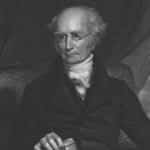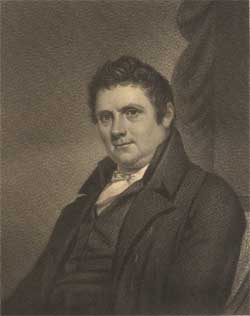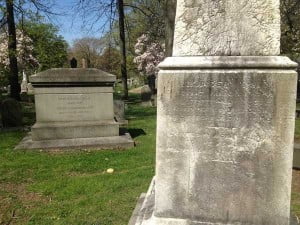The Glory of Christian Fellowship
As the Rev. Dr. William Buell Sprague worked to compile biographies of American pastors, he solicited submissions from other pastors. The famous Princeton Seminary professor Samuel Miller submitted a number of such recollections and among them, this eulogy on the life of the Rev. Alexander McLeod, a most remarkable Reformed Presbyterian pastor. Dr. McLeod died in 1833, the year that the Reformed Presbyterian denomination split. In that division, McLeod’s son, John Niel McLeod, sided with the Reformed Presbyterian Church, General Synod, a denomination which later merged with the Evangelical Presbyterian Church [1956-1965] to form the Reformed Presbyterian Church, Evangelical Synod (RPCES), and the RPCES merged in with the PCA in 1982, thus making all of that history a part of the history of the PCA :—
 FROM THE REV. SAMUEL MILLER, D.D.
FROM THE REV. SAMUEL MILLER, D.D.
Theological Seminary, Princeton. January 30,1849.
Rev. and dear Sir : In thinking of the appropriate subjects of the large work on Clerical Biography in which you have for some time been engaged, I of course expected you to include a notice of the life and character of the late Alexander McLeod, D.D., of the city of New York. Few names among the departed have a higher claim to a place in your list, than the name of that distinguished divine. When, therefore, I was requested, as one who had enjoyed the privilege of an early acquaintance and friendship with him, to make my humble contribution towards embalming his memory, I felt as if an honour had been conferred upon me, which I could not too promptly or cordially acknowledge.
You will no doubt be furnished from another source with all the desirable historical notices concerning his nativity, his education, and the leading events of his literary and ecclesiastical life. On these, therefore, I shall not dwell ; but shall content myself with merely stating my general impressions and estimate of his character, as a Man and as a Minister of the Gospel.
 My acquaintance with Dr. McLeod commenced in the year 1801, soon after he had accepted a pastoral charge in the Reformed Presbyterian Church in the city of New York, where I then resided. I had never before heard of him; but my first interview with him gave him a place in my mind seldom assigned to one so youthful. His countenance beaming at once with intelligence and benevolence, his attractive manners and his conversation, though marked with a modesty becoming his age, yet abounding in evidence of intellectual vigour and unusual literary culture, mature theological knowledge and decided piety, made an impression on me which I shall never forget. This impression was confirmed and deepened by all my subsequent intercourse with him.
My acquaintance with Dr. McLeod commenced in the year 1801, soon after he had accepted a pastoral charge in the Reformed Presbyterian Church in the city of New York, where I then resided. I had never before heard of him; but my first interview with him gave him a place in my mind seldom assigned to one so youthful. His countenance beaming at once with intelligence and benevolence, his attractive manners and his conversation, though marked with a modesty becoming his age, yet abounding in evidence of intellectual vigour and unusual literary culture, mature theological knowledge and decided piety, made an impression on me which I shall never forget. This impression was confirmed and deepened by all my subsequent intercourse with him.
At the period of which I speak, there was a Clerical Association in the city of New York, which was in the habit of meeting on Monday morning of each week. This Association comprehended most of the ministers of the different Presbyterian denominations in the city. The exercises consisted of prayer, conversation, both general and prescribed, and reading compositions on important subjects. In this delightful Association I was so happy as to enjoy, for ten or twelve years, the privilege of meeting with Dr. McLeod weekly, and seeing him in company and conversation with the Pastors venerable for their age and standing, in that day; and I must say that the longer I continued to make one of the attendants on those interviews, the higher became my estimate of his various accomplishments as a Scholar, a Christian, and a Divine.
Dr. McLeod had a remarkably clear, logical and comprehensive mind. As a Preacher, he greatly excelled. For, although he seldom wrote his sermons, and never read them in public, yet they were uncommonly rich and instructive, and at the same time animated, solemn, and touching, in their appeals to the conscience and the heart. As a Writer, his printed works are no less honourable to his memory. His Lectures on the Prophecies, his Sermons on the War of 1812, and his Discourses on the Life and Power of true Godliness, to say nothing of other publications of real value, though of minor size, all evince the richly furnished Theologian, the sound Divine, and the experimental Christian, as well as the polished and able Writer. So great indeed was his popularity in the city of New York, far beyond the bounds of his own ecclesiastical denomination, that several of the most wealthy and respectable churches in the city, in succession, invited him to take the pastoral office over them. His attachment, however, to that branch of the Presbyterian Body in which he began his ministerial career, was so strong that he never could be persuaded to leave her communion.
After I left New York, on my removal to Princeton, in the year 1813, I rarely visited the city, and almost always in the most transient manner, so that, after that year, I seldom saw Dr. McLeod. I had only two or three short interviews with him at different and distant intervals. In a few years his health became impaired, and not long after so fatally undermined, that he exchanged his ministry on earth for the higher enjoyments and rewards of the sanctuary above. In the retrospect of my life, I often call to mind the image of this beloved and cherished friend, and dwell upon his memory as that of a great and good man, from my intercourse with whom I am conscious of having derived solid advantage as well as much pleasure. But I, too, must soon ” put off this tabernacle,” and then I trust we shall be re-united in a better world, and be permitted to study and to enjoy together, to all eternity, the wonders and the glories of that redeeming love, which I have so often heard him exhibit with feeling and with power while he was with us.
That you and I, my dear Sir, may be more and more prepared for that blessedness, is the unfeigned prayer of your friend and brother in Christ,
SAMUEL
Words to Live By:
What a wonderful privilege and gift is the fellowship that Christians share with one another. Cultivate it wherever you can, and don’t neglect it. It is a beautiful fruit of our union with Christ, that in our belonging to the Savior, so we belong to one another and share with one another all the joys and all the trials of this life. More than that, we share in our common love of a Savior who first loved us and died for us, that we might have fellowship with Him throughout all eternity. Beloved, pray for one another. Pray particularly for your brothers and sisters in Christ who suffer daily because of the salvation which is found in Jesus Christ alone.
For Further Study:
One of Rev. McLeod’s more notable works, Negro Slavery Unjustifiable, is posted on the PCA Historical Center web site in PDF format. This same text is available elsewhere on the Internet, but this particular edition faithfully retains the pagination of the original 1802 printing line for line, and may be used for citations. Additionally, annotations have been added in a light gray text to illuminate some of Rev. McLeod’s references.
 Dr. McLeod sensibly felt the ills of life, but he evinced under them the most meek and quiet spirit. As an illustration of this, I may be allowed to give the following extracts from a letter dated December 9, 1815, shortly after being bereaved of two amiable and beloved children by scarlet fever:—
Dr. McLeod sensibly felt the ills of life, but he evinced under them the most meek and quiet spirit. As an illustration of this, I may be allowed to give the following extracts from a letter dated December 9, 1815, shortly after being bereaved of two amiable and beloved children by scarlet fever:—


